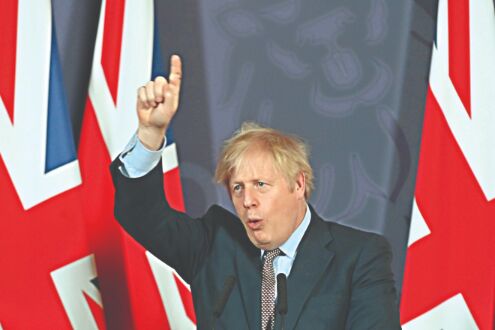Bringing holiday cheer
Despite monumental hiccups, Brexit trade talks have finally been concluded with most parties at least noting a degree of satisfaction with the long-overdue deal

The Brexit trade talks which threatened to abort UK-EU ties like the proverbial fishbone getting stuck in the gullet luckily survived in the nick of time last week to the immense relief of all concerned. Fishing, though a tiny part of the trillion-dollar annual EU-UK trade, had virtually held the entire cross-Channel relationship to ransom till the last moment. The decks have been cleared to the immense satisfaction of British Prime Minister Boris Johnson who had gambled his reputation to "Get Brexit done."
The last gasp Christmas deal has been moderately welcomed by the European Commission President Ursula von der Leyen with "quiet satisfaction" and "frankly speaking with relief." Quoting a line from Shakespeare's 'Romeo & Juliet' she said: "Parting is such sweet sorrow." That prospect has been successfully avoided., albeit with a tinge of hesitance. Nevertheless, the deal is regarded as a success for both Von der Leyen and EU's chief negotiator Michel Barnier who led the talks for ten long months with his British counterpart David Frost. The deal opens a new era of fresh cooperation in the single market of 450 people.
Curiously enough, the impact of the pandemic has emerged as one of the major factors that have helped both sides to avoid confrontation in this hour of life-threatening panic all across Europe. The unstated fear of the pandemic has certainly made the two sides hold back their pride and prejudices.
For India, the UK-EU deal is especially welcome in view of Prime Minister Johnson's upcoming visit as the chief guest on Republic Day next month with prospects of a new era of expanding trade and cultural relations. Indo-British trade relations have remained much below their potential for years and are likely to get the long-delayed fillip in spite of Prime Minister Modi's drive for Atma Nirbhar mantra of self-reliance designed to cut exports with home-produced substitutes.
Interestingly, quite some time ago Prime Minister Johnson had sent out feelers for reduction of import duty on Scotch whisky, whereas Prime Minister Modi had recently asked even military canteens in India to substitute foreign liquor with home-produced supplies. Hopefully, the spirit of giving and taking will prevail and lead both sides to mutual profit and cooperation.
On the immediate UK-EU accord, both sides are now working overtime to get the accord approved as time gallops towards the December 31 deadline. The British Parliament, which has been recalled to sit on December 30, will go through the process of voting on the deal while the European Parliament is expected to approve it on a provisional basis until sometime in February 2021 when all 27 EU members are expected to give their stamp of approval. It is highly unlikely that any one of them will exercise their veto power on the deal. Britain's opposition leader Keir Starmer has already indicated to whip his fellow MPs to back the deal despite some prominent Labour MPs having reservations over it.
For Prime Minister Johnson, the deal comes as a moment to savour. He hailed the accord as it would preserve and promote "free trade for millions of people in the UK and across Europe." Despite difficulties during the course of negotiations and compromises, an upbeat Johnson underscored: "We never wavered from the goal of restoring national sovereignty."
For Britain, the deal is especially sound as the trade pact does not affect services which make up a huge chunk of the British economy, including banking that makes London the world's top financial capital to rival New York. However, the UK will have to make sure that it will stick to guarantees that it will not abuse state aid to give its firms and businesses any unfair advantage. Nor will it flout EU regulations on taxation to undercut companies in the European Union.
Irish Prime Minister Micheal Martin, however, let it be known: "There is no such thing as a 'good Brexit' for Ireland. But we have worked hard to minimise the negative consequences." It was the " least bad version of Brexit possible." Nevertheless, the deal comes as a much-needed relief and reassurance to Ireland as a whole — the southern Republic and Northern Ireland — as it would uphold the 1998 Good Friday agreement, though with some new customs and trade difficulties. A continued push for peace in both parts has been a special priority with all parties, including USPresident-elect Joe Biden, President Donald Trump and their predecessors.
The full text of the accord, which runs into hundreds of pages, spells out details on trade, settlement of disputes and law arrangements among a plethora of other issues. Niggling issues apart, all's well that ends well and both cross- Channel partners are heading that way.
The writer is a freelance journalist and author of ' India and Britannia — an abiding affair' and other writings. Views expressed are personal



